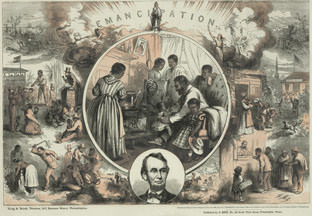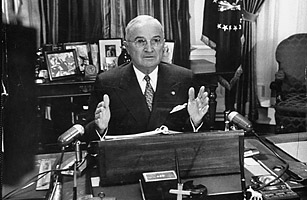
This Day in Labor History: April 9, 1865. The traitor Robert E. Lee surrenders, ending the Civil War and its Treason in Defense of Slavery. Let's talk about how it was the slaves who freed themselves as part of an uncoordinated general strike and won the war! 

This draws from what W.E.B. DuBois noted in his 1935 book Black Reconstruction: An Essay Toward A History of the Part Which Black Folk Played in the Attempt to Reconstruct Democracy in America, 1860-1880, which you should all read!
Slaves wanted freedom from the moment they were enslaved.
Whether committing suicide on the slave ships by jumping into the ocean, engaging in open rebellions like Nat Turner or the Stono Rebellion, running away, or just dreaming of a free life, slaves always wanted freedom from the hell of their lives. They took any chance to get it.
During the American Revolution and the War of 1812, thousands of slaves fled to British lines because of the promise of freedom. Many thousands more would have fled if they could have reached the British.
Remember as well that the whole point of slavery was to create a permanent labor system. We often don't talk about this much. We talk about slavery in terms of racism, for obvious reasons.
But the racism existed to serve the real reason for slavery--permanent forced labor.
The Civil War provided another opportunity for that long-cherished freedom. As soon as U.S. troops marched south, slaves began fleeing to their lines.
This most famously became an issue for the American armies to deal with when three slaves reached Fort Monroe, Virginia, which was controlled by the U.S. and where General Benjamin Butler was in charge.
When the owner came back and demanded the slaves back (the sheer temerity of Confederates to complain that the U.S. was violating the Fugitive Slave Act is amazing), Butler refused, classifying the slaves as contraband, although he never used the word.
This received the approval of Republicans in Washington, who soon passed the Confiscation Act, which stated that if the Confederacy recognized slaves as property, that the United States had the right to confiscate that property in order to win the war.
But really, even without the Confiscation Act, slaves were going to take matters into their own hands anyway.
Slaves like Robert Smalls would take enormous risks for freedom, in his case stealing a boat in the Charleston harbor while dressed as a Confederate ship captain, then picking up the families of the men with him, then fleeing north until they ran into an American ship.
Smalls became famous for his bravery. Many fled to McClellan’s armies in the Peninsular Campaign in 1862. Planters quickly realized the danger and attempted to move slaves into the Confederate interior, especially western states like Texas and Arkansas.
Perhaps most importantly, the slaves forced American officials and the Lincoln government to take the question of slavery seriously. Much to abolitionists’ frustration, Lincoln did not use the outbreak of war to end slavery. Union was his more important issue.
But the slaves self-emancipating changed that. Faced with a fait accompli that slaves were going to flee on their own, Lincoln moved toward issuing the Emancipation Proclamation.
I do think that Lincoln would have eventually done such a thing anyway, but certainly not in the fall of 1862.
Slaves’ desire to flee slavery and then fight for the United States was an overwhelming argument for Lincoln and it shows how slave agency is absolutely central to our understanding of the decline of slave labor as an American institution.
Often, they completely overwhelmed northern armies that were marching in the South. That was especially true of that of William Tecumseh Sherman marching through Georgia and South Carolina. These slaves were often very poor and in terrible health.
With the Confederacy going hungry by 1864 generally, slaves were getting less food than ever. But their sheer determination to win their freedom moved Sherman, who was no racial radical. These people were truly starving.
Later they remembered scouring the ground to find nuts, roots, or wild greens to get something in their stomachs. Sherman marching through Georgia actually made slaves more hungry, but it also gave them the opportunity to win their freedom.
Thousands of refugees were following Sherman’s armies by the time he got to Savannah in December 1864. That doesn’t mean that the officers wanted them.
Some embraced the self-freed slaves, others wanted rid of them by any means necessary, but the now freed people were going to do whatever it took for obtain and keep that freedom.
Many of these slaves wanted to join the American military and seek to then fight for their own freedom and that of their loved ones. For example, John Boston fled from the plantation where he was a slavery in Maryland in 1862.
He joined the military and later he was able to write to his wife, still stuck in slavery. He wrote, “My Dear Wife it is with grate joy I take to let you know Whare I am i am in Safety in the 14th Regiment of Brooklyn this Day I can Address you.....
... thank god as a free man I had a little truble in giting away But as the lord led the Children of Isrel to the land of Canon So he led me to a land Whare freedom Will rain in spite of earth and hell Dear you must make your Self content i am free from all the Slavers.”
This is the promise of freedom. This is how African-Americans self-emancipated. They simply walked away.
When Confederate power faded, as it did with the arrival of American armies near plantations where male authority was waning as the war went on because of military service, they took their lives into the own hands.
They effectively stopped growing cotton and rice, stopped working in the house, stopped supporting the plantation system. They followed the American army to freedom. They wanted more–primarily land, education, and eventually, the vote.
Most of that would be temporary or denied or granted and then repealed in the case of Sherman’s Special Order No. 15 that gave slaves 160 acres of confiscated plantation lands between Charleston and the Florida border.
The promises of emancipation would not be fully implemented. But whatever happened, slavery was dead. And it was dead in no small part because the slaves themselves decided they wouldn’t be slaves any longer.
And the now-freed slaves joyously rubbed their freedom in their masters’ faces when they could. The brilliant letter from ex-slave Jourdon Anderson to his ex-master Col. P.H. Anderson is the greatest document in American history. Read it!
lettersofnote.com/2012/01/30/to-…
lettersofnote.com/2012/01/30/to-…
Back Sunday to talk about the crushing of the UFCW at Hormel in 1986.
• • •
Missing some Tweet in this thread? You can try to
force a refresh







